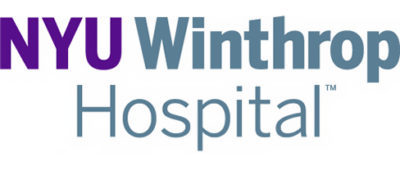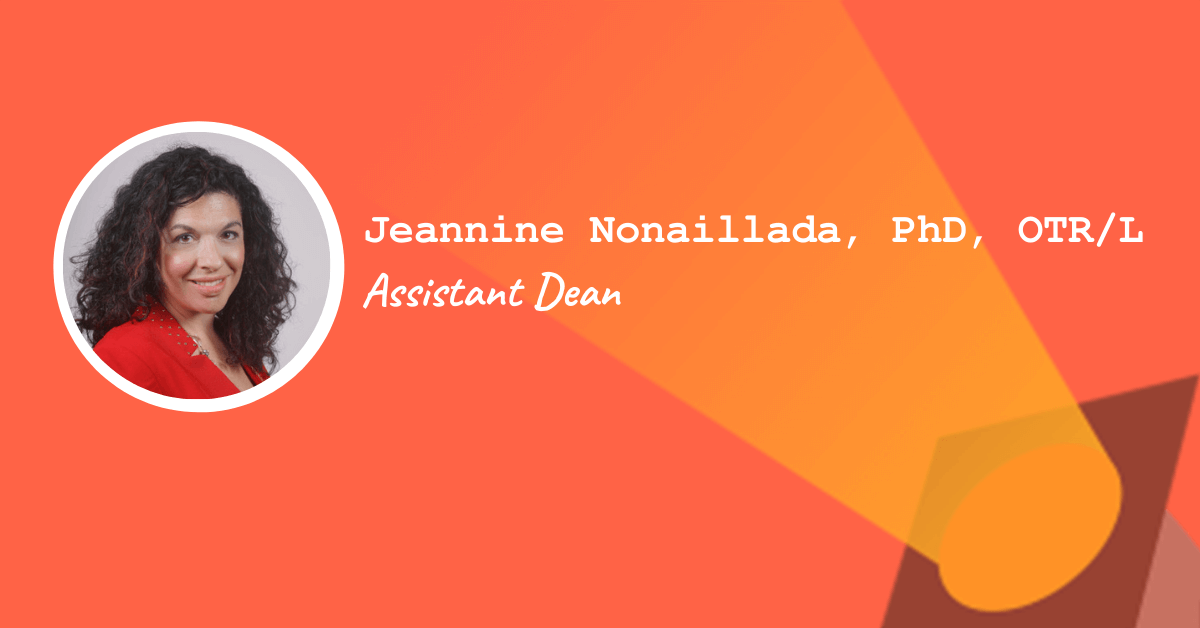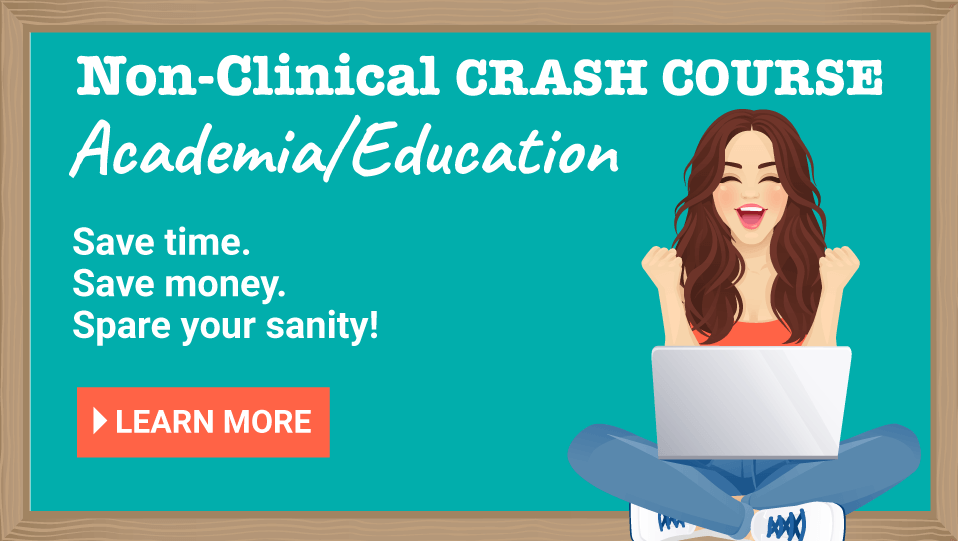Today’s non-clinical spotlight focuses on Jeannine Nonaillada, who went from occupational therapist to assistant dean of a medical school!
This post may contain affiliate links or codes. This won’t increase your cost, but it helps keep TNCPT alive, and free of annoying ads! Thank you for your support. 🙂
What is your full name and current title?
Jeannine Nonaillada, PhD, OTRL, BCG
Assistant Dean, Curriculum & Faculty Development
NYU Winthrop Hospital

Where did you go to OT school, and when did you graduate?
University of Hartford, Bachelor of Science in OT, 2001
What did you do when you first finished school, and for how long?
OT in a subacute rehab for three years, then continued to work in SNF and hospitals for up to 10 years
At what point did you decide to go for a non-clinical job, and why?
Well, I had done clinical care for about 10 years, then got my first non-OT job in the hospital I was working at at the time, as Patient Safety Program Manager.
How did you initially learn of the role?
I looked up the patient safety role on internal opportunities on my current hospital site. The job requirements specifically said would take an RN, PT, OT, or pharmacist. I was like, OMG I HAVE to get this job—they are actually acknowledging that an OT can do other things!
Don’t those roles usually go to RNs?
YES!!!!! Completely!
Why do you think you wound up landing the role?
Truth be told, my boss and I had that conversation at the time, she told me she was blown away by my skillset and what I had accomplished, AND that I was also getting a PhD.
She was a PhD nurse, and valued clinicians who saw the importance of leadership and research.
But also, I brought new aspects of patient safety to her department. For example, I was stressing falls prevention, ergonomics, and safe patient handling.
These were all things that had not previously been part of the safety program; they had been focused solely on infection control, medication reconciliation, patient identification, etc.
Did you need any additional/special training or education to assume a patient safety role?
Yes, we went to Executive Patient Safety Training at the IHI (Institute for Healthcare Improvement) and I also received Just Culture Certification. Highly recommended!
What was the patient safety role like? What were your responsibilities and daily tasks?
The work was dictated by the needs of the hospital and staff. It varied quite a bit, which I loved!
Sometimes I would do task analyses for staff in radiation oncology, to see why they were getting repeated errors in dosing and procedures. I would consider things like:
- Were they frequently interrupted?
- Did they not have enough resources?
- Were they facing time issues?
Or, perhaps one particular unit on the hospital was experiencing a lot of patient falls. Then, I’d consider things like whether their staff trained on falls detection and prevention.
At what point did you decide to change jobs again, and why?
I was working on safe patient handling and falls prevention for a cancer hospital, training inter-professional staff. It was awesome at first! But, the department eventually morphed into Quality and Safety under new leadership, and my work became a bit pen-and-paper pushing (quality reviews, data searching, etc.). I found that I didn’t love it anymore.
That certainly happens to the best of us 🙂 What did you do next?
I then was invited by a geriatrician at that hospital to lead a teaching grant with her, where we would focus on training primary care providers on working with older adults. I took that on, and that is where my faculty development role came in.
I was teaching doctors, nurses, social workers, and others how to work with complex older adults AND showing them how to design patient materials and curricula—after all, many clinicians do not learn how to teach, but yet are expected to do this.
I did this for about a year, and then my current opportunity arose. I wasn’t really looking, it kind of found me.
What is your current role?
I am currently the Assistant Dean for Curriculum and Faculty Development for a 591 teaching hospital. Our hospital serves as the clinical campus for a state university medical school.
How did this role come about…or, in your own words, “find you”?
I was not looking really, but I was casually perusing for teaching opportunities since I had taught as adjunct in the past, and wanted to get back into after I got my PhD.
I came across an academic dean ad for one institution similar to the role I now have and, when I applied, they called me right way.
I got a phone interview, and I have to admit, I didn’t do as well as I would have liked. I wasn’t used to interviewing (the recent jobs I had up until that point were at same institution, and I kind of knew the key players), and it was a new scope for me, diving into medical education. But, it was an experience.
They informed me shortly after that they liked me but had filled the role, but wanted to keep me on hand for future. I said, “sure”.
A month later, I got a call from my current place, saying they received my info from the place I had interviewed. I went on an interview face to face and nailed it!
It was definitely a step up for my career, being an Academic Dean for a medical school. This is a HUGE accomplishment for an OT. I have to say, though, that having a PhD definitely helped me get out of the clinical roles. It speaks VOLUMES when many of the non clinical roles are looking for RNs.
What are your duties and responsibilities as the Assistant Dean for Curriculum and Faculty Development?
I am responsible for developing allopathic and osteopathic physicians in in the following ways:
- Writing responsive curricula
- Teaching with innovative methods
- Helping them produce scholarly products (posters, publications, etc.).
I also teach in the undergraduate medical education program, and I also conduct training sessions for residents.
In addition, I lead an 18-month program called Faculty Scholars, where I have physicians enrolled to attend monthly face-to-face classes, as well receive mentorship on an independent educational research project, guiding them toward a peer-reviewed publication.
What are some of the best parts of the job?
It is a very cool job, and I honestly love pretty much all of it!
What are some of the biggest challenges of the job?
There are certainly challenges being a non-MD in this field, but this is where more OTs need to rise to the occasion.
During your journey, have people ever given you flak for leaving patient care? If so, how did you handle it?
No, I have never gotten that. I think it speaks to the fact that so many clinicians are burned out and wondering how they can get out of it.
Do you have any special recommendations for others who are interested in leadership roles in higher ed/medicine?
Get advanced degrees if you can, you need them. If that is not feasible, then pursue certifications in certain methodologies or practices that companies value (Six Sigma, LEAN, Just Culture, etc).
Did you take any courses, or do you have any books/blogs/podcasts you can recommend to the readers?
Scholarship assessed: Evaluation of the Professoriate (Glassick et al, 1997) is a MUST for anyone needing to transform their activities into scholarship. The Blame Game by Ben Dattner is great too for leadership and management.
If you have one piece of advice to OT, SLP, and PT professionals who feel stifled in traditional roles, what would that advice be?
Be confident in what you have learned and acquired as a clinician, and do not be afraid to take on stretch assignments.
Opportunities are NOT going to be handed to you, you have to seek them out. And when you do, try not to have a chip on your shoulder. It is not most people’s fault that they do not know how your role applies. Connect the dots for them.
Thanks for your insight, Jeannine!





